 We had a long correspondence, half In English and
We had a long correspondence, half In English and
half in French. I went and stayed for a fortnight.
She was certainly very eccentric. She agreed to
pay for the food if I would provide the drinks port
and sherry she liked. She had a horror of the moon,
and if we walked out in the evenings we had to
walk either sideways or with our backs to it, as it
might cast an evil influence upon us. She objected
to the way I spoke and said one should speak like
the working classes and not be snobbish. We had
long arguments about this. In the evenings we
drank our port and sherry and I did drawings of her.
I slept in a top attic. There was no furniture except
a rather short sofa in which my feet stuck out over
the end, and one chair. Leading up to the room was
a staircase. There was no door either to the room
or at the bottom of the staircase, so at night she
would stand at the bottom of the stairs and shout
her views on philosophy and art and tell me to avoid
looking in the direction of the moon, which came in
through the window as there were no blinds. What
with the moon and the owls hooting outside and
Sophie's raucous voice holding forth on philosophy
I felt sometimes rather unnerved. One morning,
at about three a.m., Sophia screamed up the stair
case, " If you had the chance would you have gone
off with Henri? " And I screamed back, " Yes! "
After a moment's hesitation, during which I felt
rather frightened; she went back to bed. She
talked extremely well She suffered a good deal from
ill-health and was rather nervous. She wore very
old-fashioned clothes that she had had since about 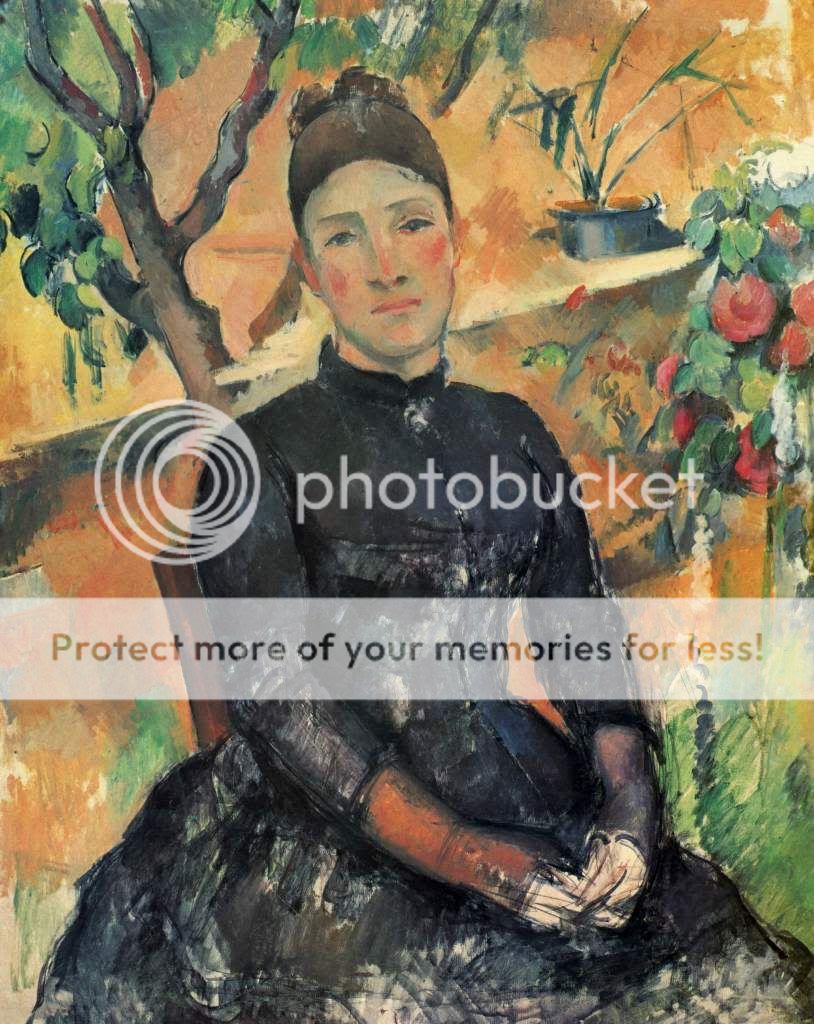
1905, and a small hat. She always reminded me of
 portraits of his wife. One day she pro
portraits of his wife. One day she pro
duced a nightdress, also very old-fashioned, it was
very elaborate and had real lace on it. She said,
" Would you like this, it might help you to attract
men? " I said, " No, thank you, I can do that quite
well without! " Sophia made pounds and pounds
of jam, she had a mania for it. We picked black
berries and bought apples and when she rested in
the afternoon I had to sit downstairs and see that it
did not burn. Sophia was reading Casanova at that
time, and from upstairs would make comments on
his disreputable life, shouting down the staircase at
me. I only intended to stay there a week, but as
there were air-raids every day in London I thought
I would stay on. Sophia had obtained from a park-
keeper the permission to use an upstairs' room in the
porter's lodge, belonging to a large estate. This she
rested in at the end of her walks. It was very dirty
and Sophia would lie on the floor and eat nuts and
throw the shells all over the floor. She came there
to contemplate, and I was only allowed in on the
condition that I would not speak. The air-raids
stopped a week later and I left. I had been invited
by Roger Fry to stay at his country house in Guild-
ford. I arrived there, rather shaken, after the
weeks of Sophia. Roger said I was quite mad to
stay with lunatics. Several members of the Strachey
family were staying there. In the evening Lady
Strachey would read us restoration plays and we
would play games. Everyone would choose a book
from the library and hide the cover. They read 
a passage from their books and the others had to
guess who had written it. Someone read three
lines and no one could guess who had written it. I
had a sudden inspiration and said " Oscar Wilde
and, much to my astonishment, it proved to be
right. It was from the pamphlet on Socialism; I
had read it years before. That was naturally the
only quotation. that I ever did guess. Roger Fry one
evening quoted a passage that no one could guess
and it turned out to be from Baedeker, It was a
wonderful week-end and I did not talk at all as
everyone else talked so brilliantly. There was only
one trouble, that a horrible bird arrived outside the
library, sat on a small tree, and whistled three notes.
This it did without ceasing. We went into the gar
den and collected pebbles with which we pelted it.
This drove it away for a few minutes and then it
came back again. When I left on Monday morning
 fry
fry
Roger was buying an air-rifle. I went back to
Fitzroy Street and started work seriously.
I painted some artificial flowers in a white vase
which Sickert bought. He still lived opposite and
asked me to breakfast. He said, You had better
come every morning at nine, as I get up at six in
Camden Town, swim for an hour, think for a bit,
and have breakfast." 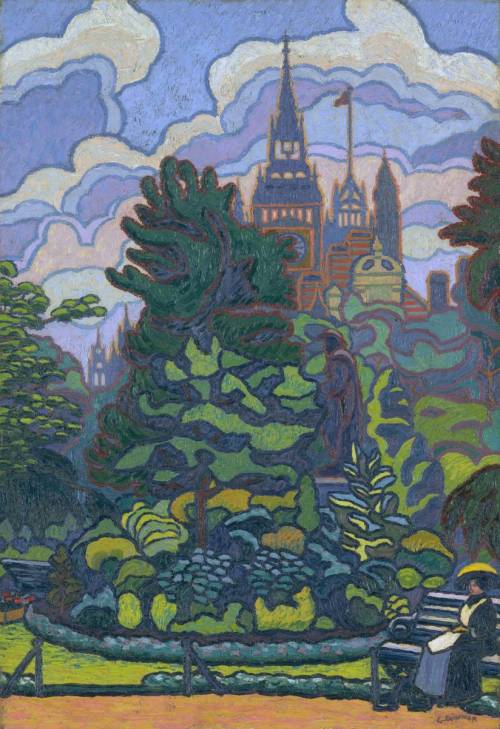 ginner
ginner
At nine I crossed the road
and had a large cup of coffee, two eggs, marmalade,
and a large cigar. Breakfast lasted until about ten-
thirty and then I was sent home to work. Some
times I sat to him for a short time. Sickert was the
kindest and one of the most intelligent and charming
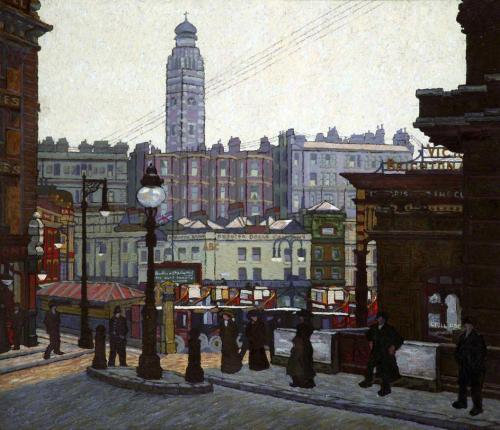
men I have ever met. He always seemed to know (ginner)
what one wanted to do next, and that is rare in any
human being. He still had his Saturday afternoons.
The studio was large and badly lighted after the
daylight had gone, and he loved shocking the
guests, who consisted of all kinds of people, from
the very grand to the humble, but serious, art
student. He had a life-sized lay figure and an iron
bedstead in one corner, with a pink counterpane;
he said it always reminded him of the " Camden
Town Murder." One day he placed the lay figure
on the bed in a rather compromising position, sat
next it with his arm round its neck, and waited for
the guests. They all looked rather startled when
they saw this unusual group. I took Beverley
Nichols there one day. He was seventeen and in the
there one day. He was seventeen and in the
London Scottish. He was very good-looking and
charming and played the piano marvellously; he
was a great success at the Saturday afternoons.
Later on I think I quarrelled with him. I forget
why. I have always regretted it as I admired his
work very much.
My friend, Marie Beerbohm, came often to Fitz-
roy Street. We all went in the evenings to the
Eiffel Tower Restaurant and ate and drank after
wards. One morning Marie came to see me. She
said, " An awful thing has happened; I was bring
ing with me half a bottle of champagne to cheer us
up. I met Walter Sickert in the street. He saw it
and said, c Disgraceful that young girls like you
should drink in the morning/ and he took it away
from me." The next morning I saw it in the wine-
bin, when I was having breakfast with him. It
remained there for about six months. One day I was
painting W. H. Davies, the poet. He said, " I don't
feel very well to-day, I had lunch with Sickert and
we had a bottle of champagne. He cooked the
lunch and afterwards said, ' Now what about
another half-bottle. " I then realized what had
happened and sure enough the next morning, when
I went to his studio, it had gone!
 Nancy Cunard, who was often at the Eiffel
Nancy Cunard, who was often at the Eiffel
Tower, started a magazine of poetry called Wheels.
Three young poets called Sitwell, wrote for it, and
there was a great deal of discussion as to their merits.
I met them one day with Ethelbert White. I
thought them most intelligent and charming, and it
was at their house that I met W. H. Davies. I was
told that he was very shy and difficult to talk to.
I had a golden evening-dress on, with a wreath of
autumn leaves round my head, and looked rather
like a dissipated Bacchante after a little champagne.
Davies was sitting on the floor and I sat down beside
him. I talked of the relative values of beer and
public-houses, and we got on admirably.
One evening Robert Ross
was there, and St. John
Hutchinson, and they decided to act " Salome/' I
had to play Salome whilst Robbie Ross acted Herod.
There were a lot of people present and I was
frightened to death, so much so, that when I had to
speak to him I made a dash for the door and hid in
the bathroom. The audience actually thought that
this was part of the play and I managed to get away
with it. Davies lived in two rooms in Great Russell
Great Russell
Street. They were filled with mice. He set a trap
for them, but was so sad when he found one dead
that he made no further attempt to kill them but
fed them instead. He said he always regretted the
days when he was a tramp as, in New York, there
were three or four of them who worked together
every day, and in the morning they went out one by
one. No one could come home until he had col
lected four dollars. He said that sometimes they
would all be back by one o'clock. I asked what they
did when they got home and he said/' We smoked
cigars and drank, and went to a music-hall."
Augustus John did a very fine painting of him.
did a very fine painting of him.
Mine was a good likeness but not a very good paint
ing. John and I both concentrated on his eye
lashes. This amused me when I saw John's painting,
which I had not seen before I started mine. One
evening, Roger Fry asked me to come to his studio
to have some coffee. I went and found there
Robert Ross and Walter Sickert. We drank wine,
and I think this was one of the most amusing even
ings I have ever had. Sickert did his famous turn of
reciting "Hamlet," imitating the voices of each char
acter, Hamlet, the King, the Queen, etc. Robbie
Ross told stories of Mr. Gladstone and Queen
Victoria; I can only remember one. I think now
how stupid I was not to have written down an
account of that evening, but I was then too modest
and self-conscious to do such a thing. The story I
remember was of the 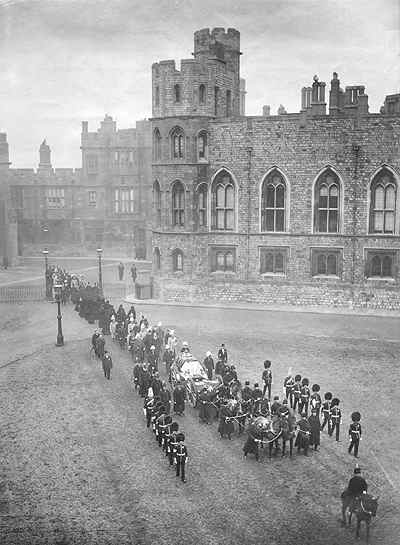
funeral of Qjieen Victoria at
Frogmore with Princess Louise and Princess Victoria.
With. Constance Stuart Richardson I had met the
" Kim," the Duke of Manchester. He said that he 
was giving a party at his house and as he only, as a
rule, had theatrical people, he would like to invite
for a change some painters; would I bring Walter
Sickert and Augustus John? This seemed an almost
impossible feat, but I promised to do my best. I
found Augustus and he said that he would consider
the matter. Sickert I asked at breakfast the next
morning, and he was delighted as he had known
Kim's father very well. 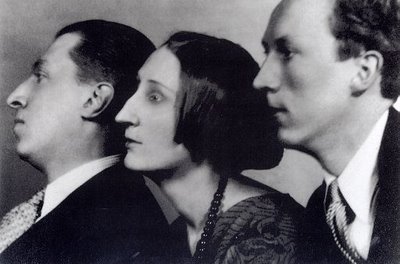 The Sitwells asked me to
The Sitwells asked me to
dinner on the night of the party and Sickert and his
wife were there. We had arranged to collect John
at his house and take him with us. We arrived
rather late and found a large motor-car outside.
John was standing on the doorstep. We all three
got in and went to the party. All kinds of stage
stars were there who were famous at that time.
The men were mostly in uniform. Melville Gideon
played and sang. Luvaun, the Maori, was there
with his Hawaiian guitar. Melville Gideon sang
Melville Gideon sang
his famous song about the " Pussy Gat " and we
drank champagne. I had my golden dress on with
the wreath of autumn leaves, which got nearer and
nearer my left ear as the evening wore on. Sickert
walked home with me and left me on my doorstep
in the early hours of the morning-
One day I got Spanish J flu*, Everyone was dying*
I went to bed in my studio. Sickert brought me
milk in the morning and Adrian Allinson, the
painter, cooked me onions in the afternoon. At other
times I was quite alone, . . . I stayed in bed about
a week without the assistance of a doctor and then
 recovered.
recovered.
Mrs. Sicker t was kind enough to ask me to stay
at their house in Gamden Town. When I got there
I stayed in bed two or three days and then got up.
She was a charming and wonderful woman and did
beautiful embroidery. Every day I watched her and
talked about myself, which seemed to amuse her.
At the end often days I felt very strong indeed and
returned to Fitzroy Street*
 Living near me was a young Belgian who had
Living near me was a young Belgian who had
been a soldier and suffered from time to time from
shell-shock. He was very poor and I asked him to
sit for me. This I enjoyed, as he sat very well, and I
talked French to him, which reminded me of Paris.
He had long hair and an interesting face. He
painted also in a rather flamboyant Belgian style.
I thought that the French were a much superior
race to the Belgians, whose mentality seemed dreary
and bourgeois in comparison. I painted a life-size
portrait of him, which Sickert bought, and one
seated at a table with all my books behind him on
a bookshelf, which was good, and was bought by
Walter Taylor. I saw it not long ago. I was pleased
with it. Going to see a painting one did years ago
is much the same as going to see an old friend whom
you have not seen for a long time. One feels nervous
and frightened that they may have become old
and haggard and ugly and falling to bits. I had a
pleasant surprise when I saw rny painting.
 The air-raids had not stopped but the barrage
The air-raids had not stopped but the barrage
was doing its work and often chased them away
before they got to London. During air-raid nights,
if I had friends with me, we went down to the cellar.
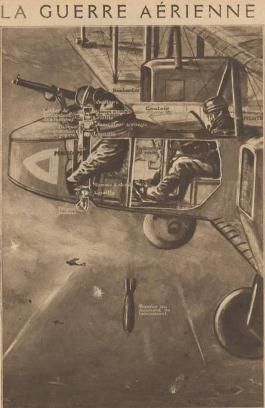 Roger Fry came and joined us if he was alone, in
Roger Fry came and joined us if he was alone, in
fact everyone in the street generally visited each
other on these occasions. We eventually got bored
with sitting in the cellar and laid in a stock of wine
for air-raid nights, and sat on the roof instead and
watched the bombs dropping. The nearest escape
from death, with the exception of the Clifford's Inn
experience that I had, was when I was in a studio
near the Eiffel Tower Restaurant with three young
men, one of whom was half German and the other
two naturalized Germans. They were playing in
turn German music when we heard the whistles
blowing for the alarm. They did not stop playing
as we heard the bombs drop- Each one that dropped
got nearer and nearer. Finally we heard a terrific
whizzing noise, that sounded as if it were just over
the roof, and then a crash quite near. The Germans
had started throwing bombs the other side of
Hampstead and had dropped one at almost regular
intervals till they got to the West End. The last
one dropped near Portland Street, on a hostel that
the girls from some large shop lived in, but they had
all gone away for a holiday. If it had dropped in a
straight line as the others did, it would have been
very near us. On another occasion I was at the
Eiffel Tower with three young men. Mark Gertler
and Geoffrey Nelson were two of them, and we were
sitting near the large windows looking on to the
street. We were amusing ourselves by playing
" consequences." We heard the whistles blowing
and then a loud crash. The bomb dropped out

side Bourne and Hollingsworth's, which was not
far away, so we had some more drinks and went
home.
My painting still showed a good deal of French
influence. At the Omega Workshops we thought
and spoke only of modern French Art, Derain,
Derain,
Picasso, Matisse and others. Under the gloomy in
fluence of London my colour, which had cheered up
in France considerably, became duller and duller. (above Derain)
J. M. Synge said that he had to live years in Paris
before he could appreciate Ireland. I have found
out that he was quite right. It was only much later,
after ten years in France, that I could see any colour
in London at all. Now I can see, but perhaps not
yet express, colour everywhere, not so brilliant per
haps, but more subtle. My painting became more
and more mechanical. Sickert said that I should
not paint from life. " Make sketches and square
them up, as the old Masters did." I tried this but
failed. Whether this was from laziness or incom
petence I do not know, anyway I could not paint
at all like that.
I had already acquired quite a good library of
rather an odd sort. Edgar and I visited the Charing
Cross Road nearly every day. He found French
books, including a small book of Jules Laforgue's
Jules Laforgue's
poems. It was the first volume of poems that he ever
published and Edgar paid sixpence for it. I sent his
books to France to him later on and regret that I
did not keep this one.
I met one day, Mrs. Ruby Lindsay, 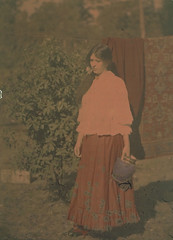 whom I had
whom I had
first seen before the War at a sketch class in Chelsea,
where Henri and I went sometimes in the evenings
to draw. She was the most beautiful person and
always wore a chain round her neck to which was
attached a little ball, covered in diamonds. I
wondered what it was and stared at her and it in
admiration when the model rested. I met her at
one of Walter Sickert's Saturday afternoons. She
was wearing it. I said, Do you remember the
sketch class in Chelsea? " And she did quite well.
I said, " Do let me look at that wonderful sparkling
ball that you have?" and when I did I saw it was a
watch. She asked me to her house in Manchester
Manchester
manchester Square, where she sometimes had models. One
afternoon I went and she had a ballet girl posing in
a pink ballet skirt. She had been a pupil of Sickert's
and was doing a painting that had a great deal of
talent. I sat in a corner and drew. I was very
badly dressed and hid my shoes under the chair.
Presently Lord Ribblesdale came in, and then Lady
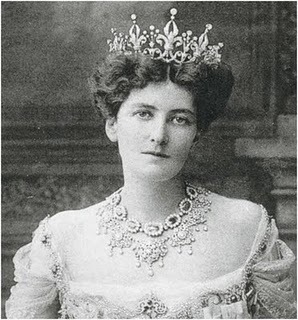 Curzon. They were charming and I hid my feet
Curzon. They were charming and I hid my feet
further under the chair, but they neither seemed to
notice or to mind. We continued to draw and they
talked about Art.
 Osbert Sitwell
Osbert Sitwell
and his brother were in the Grena
dier Guards and looked imposing in their grey
coats. I asked Osbert if he would sit for me. He
came and sat in his uniform, but it was not a success.
I painted another one of him in a small " John
Bull " top-hat, a head and shoulders, and that was
much better. He bought it, and I believe it is
amongst their family portraits. I don't know what
the family portraits think of it. I also painted
Edith in a rainbow jacket that was exhibited at the
 National Portrait Society's Exhibition at the Gros-
National Portrait Society's Exhibition at the Gros-
venor Gallery. The Taller criticized it and said,
". . . Finally was staggered by Nina Hamnett\ of
* Poetess Edith Sitwell ' and ' Poet Captain Osbert
Sitwell'; sister in the funniest Futurist frock, with
what someone called kaleidoscopic breasts/ and
brother looking nice, in spite of all, in the pale,
dreamy blue-grey and recherche high collar and
waist of a Guard's overcoat. ' This I did not regard
as very serious Art criticism. The Times said, " Miss
Edith Sitwell is a serious work in the midst of much
frivolity "; this was by Glutton Brock. People
spoke of the Sitwells in the same way as they did in
1911 of the Post Impressionists. In 1911 a com
mittee of doctors, who were experts in lunacy, were
called, and the doctors assured everyone that they
were all mad and within six months would be com
pletely forgotten, but the Sitwells persisted in the
same way as the Post Impressionists did and every
one was much disturbed. Every time the public
thought that they had vanished from sight they
cropped up again, new poems, new books, they
were like corks floating; every time you tried to
push them down they came up and floated on the
surface. I was not considered very important, only
rather a nuisance and so nobody minded much what
I did. I was already beginning to think about
France. I could not see any way of getting back
there. I thought of Modigliani and the Rotonde
and Wassilieff. I had occasional postcards, hearing
that they were doing quite well.
A Polish poet had decided to become an art
 dealer. Modigliani had come back from Nice and
dealer. Modigliani had come back from Nice and
was very poor. They all said,, " You must take up
Modigliani and give him a contract.' In Paris the
dealers buy pictures by the inch; so much for so
many inches, and so much money a month for so
many metres of canvas. The dealer said, " He is
no good, he is a blagueur." Finally, the art dealer
was so pestered, that he had to give in and gave
Modigliani so much a month. Modigliani was de
lighted and drank and worked more. The artists
at the end of the War, in Paris, and shortly after
wards, did very well as all the army officers had
money, and many liked pictures and bought them.
They also gave incredible parties, much to the
annoyance of the concierges, who never ceased to com
plain, but without any success. I began to think
seriously of leaving for Paris. I did not know what
to do about a passport. I was still rather frightened
of the police and decided to wait. I saw Marie
Beerbohm nearly every day. She used to go some
times and stay in Oxford. One day she asked me to
go too. I was delighted. We stayed at the Ran
dolph. At that time there were many amusing
people at the University; T. W. Earp above , Aldous
T. W. Earp above , Aldous
Huxley, and  Roy Campbell, who was attending
Roy Campbell, who was attending
 lectures, but was not actually an undergraduate.
lectures, but was not actually an undergraduate.
We sat on the lawn at Balliol under the mulberry
tree with Aldous Huxley, who had grey flannel
trousers, a corduroy coat, and a red tie. He was
very tall and thin and snake-like. Marie was also
very tall and thin and elegant. I sat and listened
to them talk. J. B. S. Haldane was also at Oxford.
Everyone met at Tommy Earp's rooms, and from
there we went back to the Randolph and sat down
stairs and talked and drank. Roy Campbell was
about seventeen and very beautiful indeed. He had
the most wonderful grey eyes with long black eye
lashes. He spoke with an odd gruff voice and a
funny accent. He sang Kaffir songs. He gave me a
nice copy of the poems of Arthur Rimbaud; he
presented them to me at the Randolph, rather in the
manner of a headmaster presenting a prize to the
head of the class. He had just worked his way from
South Africa in a tramp steamer. Tommy Earp was
the President of the Union. He had wonderful hair,
which sometimes he allowed us to stroke. It grew
straight up like grass and felt like a doormat. We
dined at the George, the Mitre, and and I was as nearly in Paradise as it was
possible to be. Tommy said extraordinary things.
One day someone said something about bunions,
and somebody else said, " What are bunions? " I
said, " Those things that grow on old ladies' toes. 5 '
After a bit Tommy said, " Bunions must rather
impede the Pilgrim's Progress! "
After two days we had to return to London as I
and everyone else had to work. Occasionally, when
I had time, I thought of love and wondered if
ever I would fall in love again. There seemed
so much to do and so many amusing people about,
one had no time to concentrate on such a serious
subject.
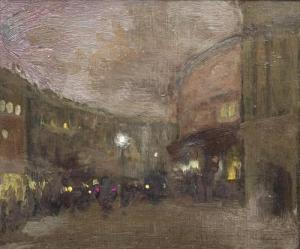
We still went to the Cafe Royal in the evenings
and then after to the Eiffel Tower. Horace Cole
was nearly always at the cafe. He had given up
ragging the Recruiting Offices. He was often with
 Lilian Shelley, the girl who sang
Lilian Shelley, the girl who sang
at the Gave of the
 Golden Calf.
Golden Calf.
She was the craziest and most
generous creature in the world. If she had a necklace
or a bracelet on and anyone said that they liked it,
she would say, " Have it! "
One day a tall young man appeared at my studio.
He said he was an art dealer and that he had bought
some of Augustus John's drawings. He bought
several of my paintings, for which he gave me a
small sum of money. This I did not mind, as
Sickert had always told me to sell things cheap
because, like that, one sold more. I asked him if he
knew Sickert and he did not, so the next day I took
him over to see him. The following day Sickert
asked him to lunch. I was not there. At that time
Sickert was by no means rich. Round his studio,
high upon the walls, was a shelf. On it were a quan
tity of canvases, mostly small ones, with their faces
to the wall. During luncheon the art dealer looked
round the shelves and said, " I make you a sporting
offer for all the canvases on the shelf fifty pounds! "
And Sickert said, " Done." He did not know him
self what was on them. When he took them down he
found that on each canvas was a very very good paint
ing. There were about fifty. The art dealer gave a
scream of delight, and on the strength of it, took a
gallery, and had an exhibition which was an enor
mous success, and everyone was delighted. One
day Sickert told me that he and his wife had taken
a house at Bath for the summer* He asked me to
come to Bath and stay there, not with them, as the
house was very small, but for me to take a room in
the town. I said that I had no money. Mrs.
Sickert went first and Sickert remained in London to
arrange some business. He took me out to lunch and
to dinner. Sometimes we would walk up to Gamden

Town and round about Euston. We walked one
evening to see a house that had been a school, kept
by an old lady, and he had been to school there
when he was six years' old. One morning when I
arrived at the studio, he said, " I can't bother to
cook the eggs this morning, we must have breakfast

at the Euston Hotel/ 5 so we arrived there about
nine o'clock. The breakfast was very good. I
thought it rather a depressing place, but Sickert
adored those kind of places. After a few days he
went to Bath. He wrote to me asking me to come
there and said that he had found a beautiful room
for me, overlooking the whole town. I would have
liked to have gone very much, but I remembered
how dreadfully ill I always felt when I was at
school. I wrote and told him that, but he answered
by a letter containing fifteen pounds, and saying
that he wanted to buy a portrait of a poet that I had
done. There was nothing else to do but to go.
Sickert met me at the station and took me to my
room. It was a most enchanting place, in a row of
workmen's cottages, half-way up a hill. The front
door was higher than the back door, as the hill
was quite steep. The landlady was the widow of a
policeman. She wore a striped blue-and-white
blouse with a belt, a large cameo brooch, and her
 hair in a bun on
hair in a bun on
the top of her head. I at once asked
her to sit for me and did a life-sized painting of her
with family photographs in suitable frames on the
table and a telescope. I forget why I put in the
telescope, I think it was a nice colour. Anyway
Roger Fry bought it and it was exhibited at the
London Group. I felt that I was behaving rather
badly, as Sickert had told me not to paint from the
model, but to do drawings and square them up.
He never came to my place so he did not know what
I was doing. I must say I was horribly bored and
I felt dreadfully ill and almost suicidal because of
the climate. I knew nobody at all, I went to
Sickert's rooms at five-thirty every day. He had
two rooms where he worked and we would go out
and I would watch him paint sketches of the river
and Pulteney Bridge. This was very interesting and
the paintings were really beautiful that he did from
his sketches. Afterwards I went back to my lodgings,
had some supper, and went to bed. I never have
been so bored in all my life. About twice a week I
dined with Sickert and his wife at their house; that
was very pleasant. On Sunday, Sickert did not go to
his painting rooms, and I had to spend the week
end entirely alone. I thought sometimes that death
would be preferable; no one to talk to and feeling
ill and depressed. I stayed at Bath for five weeks.
One day I walked up Lansdowne and peered through
the gates of the Royal School for Officers' Daughters
of the Army. I saw two girls sitting on the grass
and longed to talk to them. I walked up to the
top of the hill and into a cemetery. The cemetery
had a strange tower and sort of folly, built by some
old gentleman under the influence of a strange
emotion. I sat on a tombstone and vished I were
inside. Outside my window I could see a large,
rather modern building. It was the C. B. Corset
Manufactory, and had some trees beside it. 1
painted a picture of it from my room and sold it a
few days later to the art dealer who had bought
Walter Sickert's paintings from the shelf. I left
Bath and returned to London.
Sickert was the Professor of Art at the Westminster
Technical Institute. One day he decided to retire,
and asked me if I would teach the evening-class
there. He and Augustus John recommended me to
the committee and I got the job. The class con
sisted of five students when I arrived. They were as
much frightened of me as I was of them.
We had a long correspondence, half In English and
portraits of his wife. One day she pro
fry
ginner

there one day. He was seventeen and in the

Nancy Cunard, who was often at the Eiffel

Great Russell
did a very fine painting of him.

The Sitwells asked me to
Melville Gideon sang
recovered.
Living near me was a young Belgian who had
The air-raids had not stopped but the barrage
Roger Fry came and joined us if he was alone, in

Derain,
Jules Laforgue's
whom I had
Manchester
Curzon. They were charming and I hid my feet
Osbert Sitwell
National Portrait Society's Exhibition at the Gros-
dealer. Modigliani had come back from Nice and
T. W. Earp above , Aldous
Roy Campbell, who was attending
lectures, but was not actually an undergraduate.

Lilian Shelley, the girl who sang
Golden Calf.


hair in a bun on



No comments:
Post a Comment